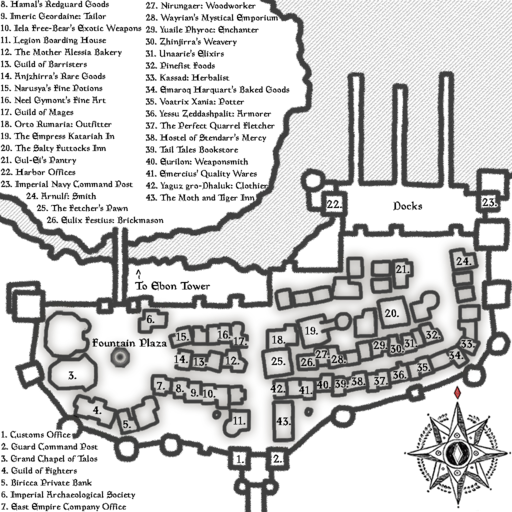|
Book Information Guide to Old Ebonheart |
|||
|---|---|---|---|
| Added by | Tamriel Data | ||
| ID | T_Sc_GuideToOldEbonheartTR | ||
| 3 | 0.2 | ||
| Locations | |||
Found in the following locations:
|
|||
Old Ebonheart is the beating heart of the Empire in Morrowind and the largest Imperial city in all the East. Seated at the very mouth of the mighty Thirr River, the city is a mighty symbol of Imperial culture and military power, and a friendly haven for travelers in the often-hostile lands of the Dark Elves.
Despite its mainland location, Old Ebonheart is part of Vvardenfell District, and the legal seat of its Duke, the noble Vedam Dren. Duke Dren, having relocated his administration to the new Ebonheart-upon-Vvardenfell in the Ascadian Isles, has left governance of the city in the hands of Burgrave Caros Cocceius, Castellan of the Ebon Tower.
Travelers entering Old Ebonheart will pass beneath a striking statue of Talos, watching over his great eastern city just as he did in life. Newcomers are required to declare any proscribed or taxable goods at the Census Office found here. The main road north continues further into Old Ebonheart, dividing the city proper into two halves. Off this main thoroughfare, a civilian visitor can find the Moth and Tiger Inn and the Guild of Mages, while weary Legionnaires may rest their heads at the Legion Boarding House.
Old Ebonheart is a city of astonishing delights, but none are more beautiful than the Grand Chapel of Talos, known across the Empire for its fine glasswork and stolid, yet beautiful architecture. Old Ebonheart's west side, where the Grand Chapel can be found, is built around the historic Fountain Plaza, where many of the city's oldest and most prominent institutions are located. The grand guild hall of the Guild of Fighters is on the Plaza, as are the Morrowind headquarters of the Briricca Private Bank and the East Empire Company. The esteemed Imperial Archaeological Society also has its Morrowind headquarters here; its museum - open to visitors - is the finest public collection of Dark Elven and Dwarven antiquities anywhere in Tamriel.
The eastern city is the dense core of Old Ebonheart's economic might. In its tight alleyways and busy shops, an enterprising buyer can find goods and services of a thousand varieties, while the docks service traders from across the Empire. Two inns in the eastern city provide lodgings - the Empress Katariah and the Salty Futtocks - though the editors of the Guide recommend that visitors avoid the latter, a tavern of low repute. The Hostel of Stendarr's Mercy may also provide for travelers seeking charitable accommodations.
Across the bridge from the Fountain Plaza, the Ebon Tower complex is an immense testament to Imperial architecture and fortification design. Eight towers, each named for a Divine, guard the spiraling double walls of the fortress, crowned by Talos' Tower - the tallest structure in the Eastern Provinces. Besides the Ebon Tower itself, the fortress courtyard hosts the headquarters of the Imperial Legion in Morrowind, as well as the Hall of Justice, seat of the Imperial Curia in Morrowind. Citizens wishing to arrange for permanent residence in Morrowind may inquire at the Resettlement Office, while those seeking the resources of a Provincial Mission may find them here. Travelers from Skyrim and Black Marsh should note, however, that those Provinces' Missions have been relocated to Ebonheart-on-Vvardenfell.
Old Ebonheart is in the Aanthirin region, the fertile hills that surround the lower Thirr River. Vvardenfell District ends at the city's walls; the rest of the region is a part of Mournhold District. To the south, the villages of Dondril and Felms Ithul are only a short trek from Old Ebonheart's gates, while the Dark Elf Temple outpost of Serynthul can be found to the east. Further south, the larger town of Vhul is one of the more notable sources of the closely-guarded native drink called punavit.
All three of the aforementioned Dark Elf settlements are ruled by the enigmatic lord of Roa Dyr, a chapel-fortress of the local Great House Indoril. Roa Dyr does not exclude visitors, but travelers are urged to take care not to offend the often-prickly Indoril. There are few services in Roa Dyr available to travelers, and no inn.
Across the river, on the western banks, a smattering of rich plantations form the eastern border of House Hlaalu territory. While members of the Hlaalu are friendlier to western travelers than their Indoril counterparts, visitors - particularly natives of Black Marsh and Elsweyr - are advised to remain alert, as it is on these plantations that the most savage customs of the Dark Elves are maintained. Should travelers find themselves embroiled in a dispute, the Guild of Barristers chapter in Old Ebonheart often handles complex issues of local and Imperial law.
The road south from Old Ebonheart terminates at its confluence with the great Veloth's Path. a well-maintained road sacred to the Dark Elves. From here, a traveler may proceed east to Mournhold, or west across the bridge-city of Almas Thirr towards the Narsis and Velothis Districts.
There are several ruined Daedric, Dwarven, and Dark Elf complexes in and around the Aanthirin. Despite the docile and civilized nature of the Aanthirin, many of these ruins are extremely dangerous. Travelers should take care to avoid the Dwarf ruins of Bthung (east of Old Ebonheart) and Bthungtch (southwest of Almas Thirr), as well as the very prominent Daedric temple of Hadrumnibibi on an island directly south of Old Ebonheart. Most dangerous of all is the abandoned Indoril citadel of Tur Julan, found on the cliffs above the Hlaalu plantations on the western bank of the Thirr. It is said that these ruins are inhabited permanently by powerful Daedric guardians, who do not hesitate to slaughter unwary visitors.
If the reader has business on Vvardenfell, the modest new fortress of Ebonheart on the island is a recommended port of entry. Though services are much more limited than its mainland counterpart, the Six Fishes Inn provides beds, and there is easy access to Vivec City. Before traveling around Vvardenfell, however, those who have not already registered with the Census and Excise Office in Old Ebonheart, should first detour to the small village of Seyda Neen, where the only Census office on the Black Isle can be found.


